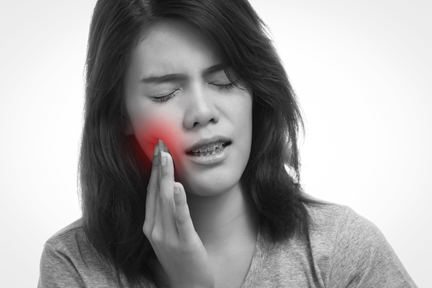Imagine this. It’s a hot (and we mean HOT!) Memphis summer day, and you’re leaving your favorite orthodontist’s office after a scheduled adjustment.
To beat the heat, you find yourself in your local drive-thru, ordering the slushiest, coldest, sweetest concoction you can find. You take one drink and BAM! your mouth feels frozen, shooting pain through your teeth, making you regret your decision.
Aside from the impending brain freeze, what’s the cause of all the pain and panic? Chances are you have sensitive teeth.
Although each mouth is different, having sensitive teeth is a common occurrence, affecting as many as 1 in 8 people. This sensitivity can occur when exposing your teeth to something hotter (or colder) than normal, something sweeter (or more sour) than normal, or if you have deep cavities or exposed root surfaces.
Why Are My Teeth Sensitive?
A number of contributing factors can be causing your tooth sensitivity. As an orthodontic patient, getting a regularly scheduled adjustment can cause teeth to change their position, which can make them more sensitive than normal, and more susceptible to pain and discomfort. Luckily, this type of sensitivity should only last a day or two and is easily treatable.

Another cause of sensitivity is thinning tooth enamel. This is due to poor brushing habits or improper dental hygiene. Failure to remove plaque and buildup can break down the enamel which protects your teeth. This can weaken your teeth, leaving them exposed and more susceptible to sensitivity.
On the flip side, if you are brushing too firmly, you can start to wear down gum tissue, exposing porous root surfaces and portions of the tooth that are not normally exposed. This ‘fresh’ surface can be extremely sensitive and give an overwhelming sense of pain when exposed.
How Do I Treat Sensitive Teeth?
Depending on the source of your sensitivity, there are several things you can do to help stop not only the pain, but the cause of sensitivity. If your pain is due to an orthodontic adjustment, it’s safe to take a mild over-the-counter pain reliever to diminish pain. In our experience, Advil and Aleve usually work best, but you can use whatever you are comfortable with.
If the sensitivity persists more than a few days, you can always give our office a call for additional advice. In the event of severe, unremitting pain, I recommend scheduling an appointment with your general dentist, who might recommend a dental filling or root canal to help alleviate the tooth pain.
 While anyone can suffer from sensitivity, braces patients sometimes face greater challenges keeping their teeth clean. Failure to completely clean around the braces can lead to worn enamel or gumline sensitivity. Following your orthodontist’s instructions for proper brushing will greatly reduce the occurrence of enamel wear and will keep your teeth strong and healthy.
While anyone can suffer from sensitivity, braces patients sometimes face greater challenges keeping their teeth clean. Failure to completely clean around the braces can lead to worn enamel or gumline sensitivity. Following your orthodontist’s instructions for proper brushing will greatly reduce the occurrence of enamel wear and will keep your teeth strong and healthy.
If your sensitivity is due to over brushing or hard toothbrush bristles, then switching toothbrushes or adjusting brush patterns can provide a great deal of relief. Honestly, though, practically everyone should use a soft bristle toothbrush. You will still be able to keep the teeth clean, without damaging the teeth and gums.
Another safe solution to minimize tooth sensitivity is to use a toothpaste designed to treat the pain. There are several different types of “sensitivity toothpastes” available and I recommend trying a few to find the one that works best for you. Sensodyne is the most popular brand, but Colgate and Crest also make great sensitivity toothpastes. After two weeks of normal use, you should feel relief and less sensitivity around your gums. You can read more about sensitivity toothpastes on this blog from Pennsylvania orthodontist Dr. Scott Frey.
Conclusion
Having sensitive teeth shouldn’t stop you from enjoying the things you’d like. With minor adjustments in oral care and brushing, sensitivity can be reduced and your teeth will be on the path to being strong and healthy.
If you are experiencing sensitivity issues, we’re always available for any questions you have. Leave a comment below, or contact our Memphis or Collierville office.
